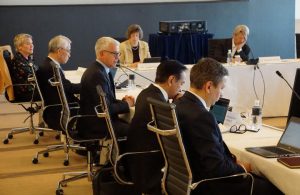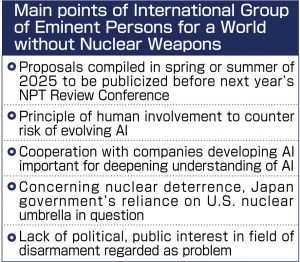International Group of Eminent Persons to make proposals next summer, reversing progress toward “world without nuclear weapons”
Jun. 8, 2024
Discussions at the meeting of the International Group of Eminent Persons for a World without Nuclear Weapons have gained momentum, with the group, established by Japan Prime Minister Fumio Kishida, deciding to put together its proposals by next summer. The group is a forum of experts from nuclear weapons states and non-nuclear weapons states who work to explore a path toward “a world without nuclear weapons.” But in its last four meetings, the group was unable to squarely tackle the issue of the elimination of nuclear weapons. The main point of focus for the group concerns risk management of the rapidly developing area of artificial intelligence (AI), on the premise that nuclear weapons exist. This report takes a look the group’s discussions held to date.
■ Discussions on nuclear abolition
The group consists of 15 experts from the five nuclear powers of the United States, China, Russia, the United Kingdom, and France, as well as New Zealand, which is a signatory nation to the Treaty on the Prohibition of Nuclear Weapons (TPNW). The group’s first meeting was held in the A-bombed city of Hiroshima in December 2022, and gatherings have also been held in Tokyo, Nagasaki, and Yokohama.
At the meetings, members have focused on such issues as the global trend in the direction of strengthening nuclear capabilities, and some members have even expressed approval of the theory of nuclear deterrence, which holds that nuclear war can be avoided by maintaining a balance among the nations based on their possession of nuclear weapons. Considering that the group’s predecessor body, the Group of Eminent Persons, established when the prime minister was foreign minister, pointed out in 2019 that “nuclear deterrence is dangerous to global security,” the current discussions seem to represent a step backward.
At the meeting held in Yokohama in May this year, some of the members from overseas questioned Japan’s reliance on the U.S. nuclear umbrella even as the nation advocates for “a world without nuclear weapons.” Michiko Kodama, assistant secretary general of the Japan Confederation of A- and H-Bomb Sufferers Organizations, said, “I would like to see them directly take up the issue of breaking free from the nuclear umbrella.”
■ AI risk management
Another issue has arisen as one of the group’s main themes — the management of risk to nuclear disarmament posed by the development of AI. The members see it as a problem that the development of AI could destabilize the systems used to operate nuclear weapons and thereby increase the risk of nuclear war.
In May, the group affirmed the principle of human involvement in decision-making. Takashi Shiraishi, special professor emeritus at Kumamoto Prefectural University and chair of the conference, said that the proposals should include the need for nations to engage in dialogue with companies working to develop AI.
Tatsujiro Suzuki, professor in the Research Center for Nuclear Weapons Abolition at Nagasaki University, said, “AI development is advancing day by day in the private sector, making it difficult to understand the actual situation. This direction for the proposals is not wrong.”
■ Involvement of political leaders
The 15 members from different countries are not the only ones who are engaging in discussions. The conference states it is unique in that current and former political leaders can also participate. In fact, Barack Obama, the first sitting U.S. president to visit Hiroshima, and others sent messages to the group’s first meeting. But they did not participate in the discussions. In fact, the number of political leaders, including former leaders, that have exchanged opinions with the group’s members amounts to only two.
An online meeting is scheduled for later this year, and a final meeting will be held next spring. By next summer, the group will compile proposals with an eye to the Nuclear Non-proliferation Treaty (NPT) Review Conference, scheduled to be held in 2026.
Keywords
The International Group of Eminent Persons for a World without Nuclear Weapons, proposed by Prime Minister Fumio Kishida, is composed of a total of 15 experts from the five nuclear powers (the U.S., China, Russia, the U.K., and France), as well as Japan, Germany, Argentina, Jordan, Indonesia, India, and New Zealand. The members explore a path toward nuclear disarmament, regardless of differences in the policies of their nations. Its predecessor was the Group of Eminent Persons, a body established in 2017, when Prime Minister Kishida was Japan’s foreign minister.
(Originally published on June 8, 2024)
■ Discussions on nuclear abolition
The group consists of 15 experts from the five nuclear powers of the United States, China, Russia, the United Kingdom, and France, as well as New Zealand, which is a signatory nation to the Treaty on the Prohibition of Nuclear Weapons (TPNW). The group’s first meeting was held in the A-bombed city of Hiroshima in December 2022, and gatherings have also been held in Tokyo, Nagasaki, and Yokohama.
At the meetings, members have focused on such issues as the global trend in the direction of strengthening nuclear capabilities, and some members have even expressed approval of the theory of nuclear deterrence, which holds that nuclear war can be avoided by maintaining a balance among the nations based on their possession of nuclear weapons. Considering that the group’s predecessor body, the Group of Eminent Persons, established when the prime minister was foreign minister, pointed out in 2019 that “nuclear deterrence is dangerous to global security,” the current discussions seem to represent a step backward.
At the meeting held in Yokohama in May this year, some of the members from overseas questioned Japan’s reliance on the U.S. nuclear umbrella even as the nation advocates for “a world without nuclear weapons.” Michiko Kodama, assistant secretary general of the Japan Confederation of A- and H-Bomb Sufferers Organizations, said, “I would like to see them directly take up the issue of breaking free from the nuclear umbrella.”
■ AI risk management
Another issue has arisen as one of the group’s main themes — the management of risk to nuclear disarmament posed by the development of AI. The members see it as a problem that the development of AI could destabilize the systems used to operate nuclear weapons and thereby increase the risk of nuclear war.
In May, the group affirmed the principle of human involvement in decision-making. Takashi Shiraishi, special professor emeritus at Kumamoto Prefectural University and chair of the conference, said that the proposals should include the need for nations to engage in dialogue with companies working to develop AI.
Tatsujiro Suzuki, professor in the Research Center for Nuclear Weapons Abolition at Nagasaki University, said, “AI development is advancing day by day in the private sector, making it difficult to understand the actual situation. This direction for the proposals is not wrong.”
■ Involvement of political leaders
The 15 members from different countries are not the only ones who are engaging in discussions. The conference states it is unique in that current and former political leaders can also participate. In fact, Barack Obama, the first sitting U.S. president to visit Hiroshima, and others sent messages to the group’s first meeting. But they did not participate in the discussions. In fact, the number of political leaders, including former leaders, that have exchanged opinions with the group’s members amounts to only two.
An online meeting is scheduled for later this year, and a final meeting will be held next spring. By next summer, the group will compile proposals with an eye to the Nuclear Non-proliferation Treaty (NPT) Review Conference, scheduled to be held in 2026.
Keywords
The International Group of Eminent Persons for a World without Nuclear Weapons, proposed by Prime Minister Fumio Kishida, is composed of a total of 15 experts from the five nuclear powers (the U.S., China, Russia, the U.K., and France), as well as Japan, Germany, Argentina, Jordan, Indonesia, India, and New Zealand. The members explore a path toward nuclear disarmament, regardless of differences in the policies of their nations. Its predecessor was the Group of Eminent Persons, a body established in 2017, when Prime Minister Kishida was Japan’s foreign minister.
(Originally published on June 8, 2024)









